After the Center for Disease Control confirmed the earliest cases of COVID-19 in the United States, consumers flocked to retailers in droves to stock up on goods such as hand sanitizer, face masks, toilet paper, bottled water, and other essentials in anticipation of the impending outbreak. By early March 2020, reports emerged of retailers and third-party sellers on platforms like Amazon capitalizing on consumer fears by drastically increasing prices on these items hundreds of percentage points beyond their suggested retail price. Other reports have emerged of commentators noting the opportunity for pharmaceutical companies to raise drug prices. These reports have generated significant concern among state and federal officials across the country about price-gouging practices amidst the ongoing COVID-19 emergency.
At present, there is no federal statute specifically designed to combat price gouging. But at least 34 states and the District of Columbia have enacted dedicated anti-price-gouging (APG) statutes or regulations that prohibit excessive price increases on certain categories of goods and services upon the occurrence of a triggering event, typically a declared state of emergency. Several other states enforce prohibitions on price gouging through general consumer-protection statutes that forbid unfair or deceptive trade practices.


 Karen Hoffman Lent and Kenneth Schwartz
Karen Hoffman Lent and Kenneth Schwartz




